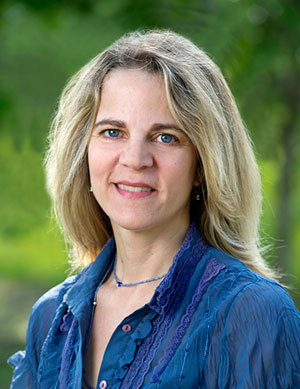 Sheila Christopher
Sheila Christopher
Sheila Christopher, a research assistant professor at the University of Notre Dame Environmental Change Initiative, has won a research grant to study the effects of new farmland-drainage practices in reducing farm runoff in the Western Lake Erie Basin.
Christopher, who works with Ludmilla F., Stephen J., and Robert T. Galla Professor of Biological Sciences Jennifer Tank on the Land Use and Water Quality program at ECI, won the $155,358 grant from the University of Michigan Water Center for her project, “Watershed-scale assessment of stacked drainage practices in the Western Lake Erie Basin to improve water quality.” The Western Lake Erie Basin is intensively farmed, and runoff from that land delivers nutrients and sediments into the lake, contributing to recurring algae blooms, subsequent hypoxia and associated ecological problems. Christopher’s project will evaluate the effectiveness of two relatively new farmland-drainage practices — the two-stage ditch and tile drain management — that hold great promise for improving water quality. A computerized watershed model will be used to assess the two-stage ditch coupled with field-scale tile drain management on water quality in the Western Lake Erie Basin.
The grant was one of eight awarded by the University of Michigan Water Center on Wednesday (Sept. 11). These two-year grants, which range in size from $155,358 to $458,290, were awarded to multidisciplinary teams led by researchers at universities in Michigan, Indiana, Wisconsin, Minnesota and New York. The eight winners were selected from 90 proposals submitted.
The projects will support efforts to restore native fish migrations across the Great Lakes Basin, assess strategies to restore the health of the Green Bay ecosystem under a changing climate, improve water quality in the Western Lake Erie Basin, guide ecological restoration of Saginaw Bay, assess the effectiveness of wetlands restoration projects in the Lake Ontario/St. Lawrence River watershed, determine the relative contributions of agricultural runoff and sewage discharge in fecal pollution entering lakes Michigan and Erie, and map Great Lakes environmental stressors.
The eight project teams include 73 researchers from 16 universities in the United States and Canada, nine agencies, two consulting firms, two non-governmental organizations and one tribe. To read detailed descriptions of the eight grants, including their principal investigators and award amounts, visit graham.umich.edu/water.
The Water Center engages researchers, resource managers, policymakers and nonprofit groups to support, integrate and improve freshwater restoration and protection efforts. During its first three years, the Water Center is focusing on the Great Lakes, working to enhance regional dialogue and collaboration to identify and fill priority knowledge gaps.
The Great Lakes hold 20 percent of the world’s freshwater. The region includes more than 10,000 miles of coastline and numerous globally rare plant and animal species. In addition, the Great Lakes support a wide range of recreational and economic activities, including vibrant tourism and a sport fishing industry that contributes $4 billion to the economy.